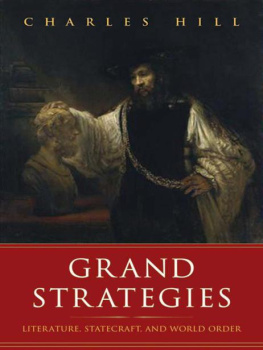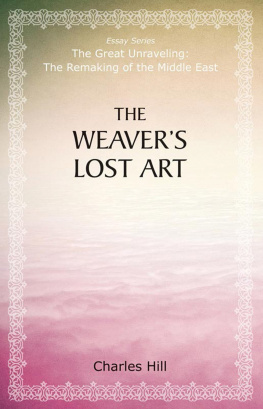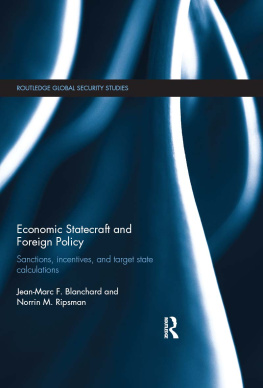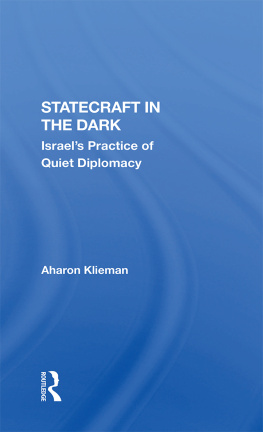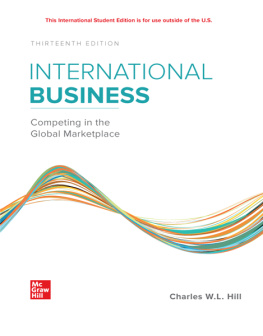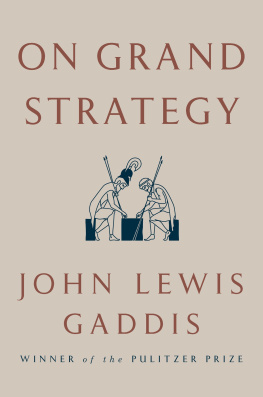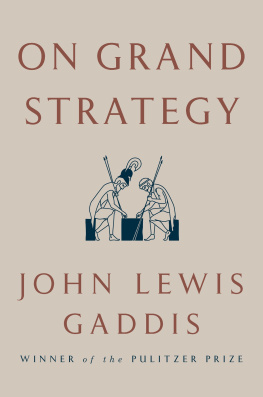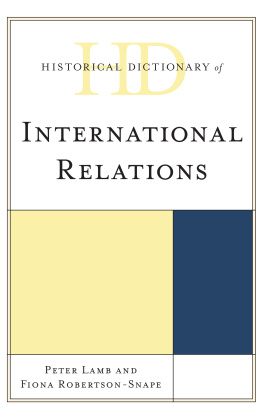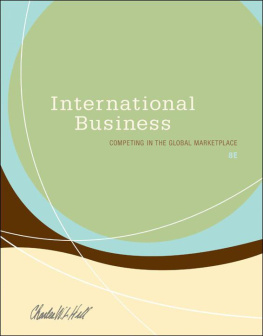GRAND
STRATEGIES
LITERATURE,
STATECRAFT, AND
WORLD ORDER
CHARLES HILL
Yale
UNIVERSITY PRESS
New Haven & London
Copyright 2010 by Charles Hill.
All rights reserved.
This book may not be reproduced, in whole or in part, including illustrations, in any form (beyond that copying permitted by Sections 107 and 108 of the U.S. Copyright Law and except by reviewers for the public press), without written permission from the publishers.
Designed by Mary Valencia.
Set in Simoncini Garamond type by Duke & Company, Devon, Pennsylvania.
Printed in the United States of America by Sheridan Books, Ann Arbor, Michigan.
Library of Congress Cataloging-in-Publication Data
Hill, Charles, 1936
Grand strategies : literature, statecraft, and world order / Charles Hill.
p. cm.
Includes bibliographical references and index.
ISBN 978-0-300-16386-5 (cloth : alk. paper) 1. Diplomacy in literature. 2. International relations in literature. 3. DiplomacyHistory. 4. International relationsHistory. 5. Politics and literatureHistory. I. Title.
PN56.D55H55 2010
809.933581dc22
2009049442
A catalogue record for this book is available from the British Library.
This paper meets the requirements of ANSI/NISO Z39.48-1992 (Permanence of Paper).
10 9 8 7 6 5 4 3 2 1
CONTENTS
WORKS DISCUSSED IN THIS BOOK
PROLOGUE
Cao Xueqin, The Dream of the Red Chamber
Dante, The Divine Comedy
Conrad, The Rescue
1 CLASSICAL ORDERS
Homer, The Embassy to Achilles
Aeschylus, The Oresteia
Xenophon, The March Up Country
Thucydides, The Peloponnesian War
Virgil, The Trojan Horse
2 CREALIVE DISORDER
Shakespeare, Henry VI
Schiller, Jungfrau von Orlans
Twain, Personal Recollections
Shaw, Saint Joan
Hugo, The Hunchback of Notre Dame
Machiavelli, Letter of Dante to Vettori, Dec. 10, 1513
Holbein, The Ambassadors
Montaigne, Of the Cannibales
Chesterton, Lepanto
Cervantes, Don Quixote
Shakespeare, Troilus and Cressida
3 SOURCES OF MODERN WORLD ORDER
Grimmelshausen, Adventures of Simplicissimus
Defoe, Memoirs of a Cavalier
Grotius, De Jure Belli ac Pads (The Law of War and Peace)
Stacton, People of the Book
Huxley, Grey Eminence
Schiller, The Wallenstein Trilogy
Grass, The Meeting at Telgte
4 WHAT KIND OF STATE?
Hobbes, Leviathan
Marvell, Horatian Ode on Cromwells Return
Milton, To the Lord General Cromwell
Milton, Paradise Lost
Swift, Gullivers Travels
5 ENLIGHTENMENT
Rousseau, Confessions
Kant, Perpetual Peace
Gibbon, The Decline and Fall of the Roman Empire
Irving, Mahomet
6 AMERICA
Las Casas and Seplveda, Debate at Valladolid
Ralegh, The Ocean to Cynthia
Shakespeare, The Tempest
Defoe, Robinson Crusoe
Locke, Second Treatise of Government
Publius (Hamilton, Madison, and Jay), The Federalist Papers
Washington, Farewell Address
Thoreau, Walden
Thoreau, Plea for Captain John Brown
Tocqueville, Democracy in America
Whitman, Leaves of Grass
Lincoln, Discoveries and Inventions
Lincoln, A House Divided
Holmes, The Wonderful One-Hoss-Shay
Adams, The Education of Henry Adams
ONeill, Mourning Becomes Electra
7 DISORDER AND WAR
Dickens, A Tale of Two Cities
Bismarck, The Ems Dispatch
The Internationale
Nietzsche, The Birth of Tragedy
Rimbaud, Un Saison en Enfer and La Bateau ivr
Dostoevsky, Demons
Conrad, The Secret Agent
Pasternak, Dr. Zhivago
Mann, The Magic Mountain
Proust, In Search of Lost Time (Remembrance of Things Past )
Eliot, The Waste Land
Kafka, The Castle
Tennyson, Ulysses
Connolly, The Unquiet Grave
8 THE IMPORTED STATE
Liu E, The Travels of Lao Tsan
Malraux, Mans Fate
Lee Kuan Yew, The Singapore Story
Ma Jian, Beijing Coma
Eliot, Daniel Deronda
Lawrence, Seven Pillars of Wisdom
Spark, The Mandelbaum Gate
Kipling, Kim
Rushdie, Midnights Children
Rushdie, The Satanic Verses
9 THE WRITER AND THE STATE
Broch, The Death of Virgil
Shultz, Speech before PEN International
Pope John Paul II, Address at the 50th Anniversary of the United Nations
EPILOGUE
Calasso, The Ruin of Kasch
PROLOGUE:
BOOKS OF THE RED CHAMBER
L ate on the morning of February 21, 1972, I listened at my desk in the American Embassy Saigon to Armed Forces Radio Vietnams relay of an announcer describing the arrival of President Nixon in Beijing. I had been a Foreign Service China watcher through the horrendous years of the Great Proletarian Cultural Revolution, when Chairman Mao sent thousands of young Red Guards out to burn books and put an end to Chinas traditional culture. After my diplomatic reporting on the Cultural Revolution I had been assigned to wartime Vietnam under a general instruction to look for indications that China might intervene, as it had when Mao ordered human-wave attacks which seized nearly all the Korean Peninsula from American forces in early 1951. For more than two decades, American strategists considered themselves engaged in a colossal struggle against revolutionary communism, an ideology bent on destroying and replacing the established international state system of world order. Now here were Richard Nixon and his chief adviser, Henry Kissinger, presenting themselves to the Great Helmsman of the Peoples Republic of China.
In the manner of dictators, Mao suddenly summoned the two Americans to his private residence in the sequestered Chungnanhai compound next to the Forbidden City. Kissinger later described Maos study in his memoirs: Manuscripts lined bookshelves along every wall; books covered the table and the floor, it looked more like the retreat of a scholar than the audience room of the all-powerful leader of the worlds most populous nation.
The few unfrequented bookshops left in China offered little else but the writings of Mao and Marx and Lenin. But here in his lair, Mao had hoarded all the great texts his heart desired. He knew them well, and marked them up. (If you dont put your pen in action, it cannot really be considered reading, he had said.) The Outlaws of the Marsh (or The Water Margin) , a tale of bandits in rebellion against oppressive lords, inspired him, and classical Chinese poetry too, much of which concerns matters of war and statecraft; Mao inflicted his own considerable poetic output on the masses. But what are we to make of Maos love for the huge eighteenth-century novel The Dream of the Red Chamber , which he boasted of having read five times? He fended off questions by claiming that the novel showed feudal China in decline; but far from revolutionary, The Dream of the Red Chamber , replete with the stratagems of an array of girls swirling around a romantically individualistic young man in search of experience and pleasure, all in a marriage plot, has as many examples of statecraft and diplomatic intrigue as the novels of Jane Austen.
What are dictators, generals, and strategists looking for in the books they keep around them or carry with them? Certainly Mao was not made a better person by his extensive reading in classic texts. The works considered in this book address the conundrums of statecraft in ways which may be used for good or ill by people in power. Inhumane leaders have made use of humane letters; the Nazis cultivated the arts. But admirable underlying principles of statecraft can be found in nearly all the texts considered here.
Alexander the Great carried the Iliad with him on his eastern conquests, keeping it, Plutarch said, with a dagger under his pillow, declaring that he esteemed it a perfect portable treasure of all military virtue and knowledge. Prior to sainthood, Thomas More read Roman poets and playwrights. Queen Elizabeth I read Cicero for rhetorical and legal strategy. Frederick the Great studied Homers Odysseus as a model for princes. John Adams read Thucydides in Greek while being guided through the labyrinth of human nature by Swift, Shakespeare, and Cervantes. Abraham Lincoln slowly read through Whitmans Leaves of Grass and was changed by it. Gladstone, four times prime minister under Queen Victoria, wrote volumes of scholarly commentary on Homer and produced vivid translationsthe best kind of close readingof Horaces Odes. Lawrence of Arabia, who wrote himself into history as a fictional character leading Arab tribes in revolt against the Ottoman Turks, carried Malorys Morte dArthur , if not in his camels saddlebags then in his head.

